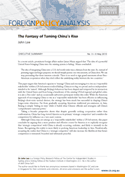
‘The idea that the US can manage China is failing and America, including its allies like Australia, must confront the realities of dealing with Beijing,’ says John Lee.
Beijing’s behaviour has been partially tempered by its participation in a US led system, but it often behaves as a subversive participant within this order and these actions should not be ignored.
‘The current approach assumes that Chinese longer-term interests and ambitions can be moulded according to the circumstances of China’s rise.’
Whilst encouraging China to become a ‘responsible stakeholder’ has been useful in managing some aspects of China’s rise, it has failed to fundamentally alter China’s long term objectives.
China’s future ambition still remains in building its ‘comprehensive national power’ at the expense of America and its allies and partners. Chinese leaders and strategists believe that becoming the ‘preponderant power in Asia’ will require the substantial diminution, if not outright elimination, of the American presence.
‘The US must recognise that differing regional objectives, material interests, and political values prevent the existence of genuine US-China strategic cooperation—at least in the foreseeable future.’
Washington, and its allies such as Canberra, need to help strengthen the incentives for peace and simultaneously develop a strategic framework for competing effectively with China. Paradoxically, recognising the reality of competition increases the chances that the ongoing contest for influence can remain bounded, manageable and ultimately peaceful.
‘Canberra must work with Washington to maintain peaceful co-operation yet at the same time accept that there will continue to be areas of competition with China.’











